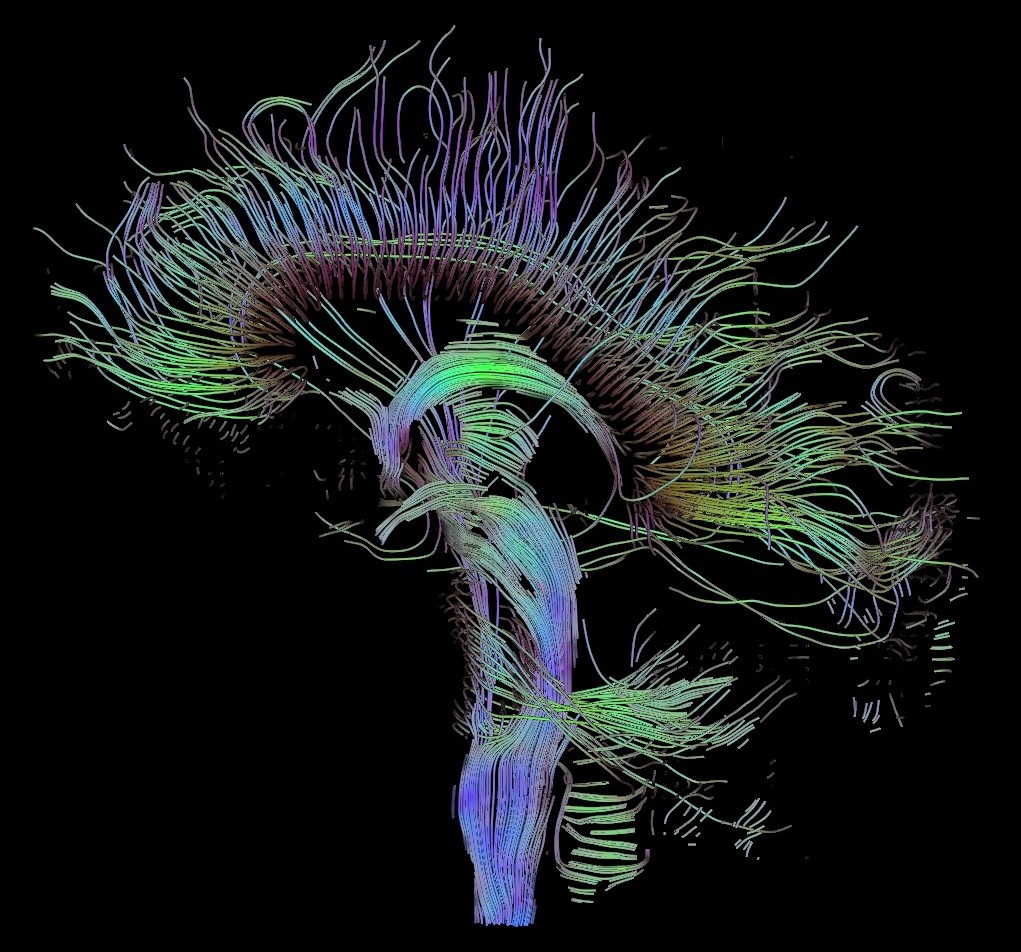Decentralization: It’s not just Rational, it’s Natural, and your brain uses it all the time!
Crowdsourcing Brain Cells Build Consensus to Make Decisions
A newly published study in Frontiers in Neuroscience presents interesting insights into how our brains themselves work. It’s interesting to consider the parallels between how neurons process information and make decisions and how other Complex Adaptive Systems, including networks of computers or of individuals, do so. The title of the research article of course uses rather more technical terms in order to be specific: Dual Coding Theory Explains Biphasic Collective Computation in Neural Decision-Making.
This image of a connectome illustrates just one view of the myriad connections that brain cells use to share information.

Here I’ll present a very brief summary and then go on to some analogous systems and relevant ideas about the generalities of using dispersed knowledge. For more details, those not so very familiar with neuroscience may like this press release.
A Two-Step Process
First, many neurons collect and share information.
Second, as they accumulate more and more information, they approach a consensus.
Although the concept of Collective Intelligence came from considering many humans interacting to make decisions, it’s now clear that we use it all the time, insude our own brains.
Will we make good use of Knowledge and Decisions or go down the The Road to Serfdom?
Knowledge and Decisions is one of my favourite books (by the brilliant Thomas Sowell. For more about specific ideas in terms of economics, please see my previous post about Steemonomics. Here I want to go in a more general direction, thinking about any generic Complex Adaptive System, which is just a newer term (made fashionable later by ecologists and other natural scientists) for what economist and Nobel laureate Friedrich A. Hayek had earlier termed Spontaneous Order. (As an aside, I do have to wonder why so many ecologists and other natural scientists fail to cite or otherwise credit Hayek. Do they not know that he had the idea first, or do they simply prefer not to give him credit because they dislike his Classical Liberalism, which is nowadays more commonly called a libertarian view. It is no secret that the vast majority of ivory-tower academics are liberals in a very different sense, one that does not respect private property to anywhere near the degree that Classical Liberalism does. But, I digress…)
Of course to most anyone net-savvy enough to be on Steemit, it’s obvious that our brains are far from the only complex networks that process a wide diversity of information and, one way or another, make use of it. For example, markets and in an even more sloppy and nearly always perverted way, even governments do this all the time.
Humans are uniquely able to benefit from distributed knowledge
Hayek argued that the spontaneous organization of many humans, sharing knowledge and culture, was what has truly distinguished humans from other animals and allowed our species to spread and succeed so widely. Bees, for example, also work together effectively, but in a way that is hard-wired by evolution. They cannot quickly incorporate new knowledge and change their culture or organization the way that humans can. Sowell later elaborated on how humans make use of broadly dispersed knowledge. Although neither rejected government entirely, they both made powerful arguments for why centralized decision making cannot effectively utilize vast amounts of dispersed information. Sowell has also compiled data and catalogued many examples of the failures of central planning.
The Allee Effect refers to the observation that animals benefit from cooperation with large numbers of their own species. Some species of birds, such as the starlings pictured below, thrive by flocking together. They do NOT accomplish this by appointing a single ruler or by establishing a centralized government.

We humans can benefit from decentralized intelligence and distributed knowledge even more than other species, because in addition to now having a variety of decentralized networks available that allow sharing information at unprecedented speed, we also have the capacity to rapidly alter our culture and behavior in response to changing conditions.
Or, as so many individuals have done in the past, each of us can choose to submit to the rigid control of a centralized government, allowing a select few to make very important decisions. If too many choose that road, the result will be poverty, oppression, and the horrors of war.

S. Lan Smith
Kamakura, Japan
June 08, 2017
Very good writing with good points. I really like the idea of decentralization.
Thank you.
I like it too!
A very good read, thank you for putting this together it is very pertinent. Hope your day is absolutely lovely! :-)
Thank you!
I simply enjoy science, economics, and complexity.
Sometimes I read a post and just think "YES" the whole time.
Thanks!